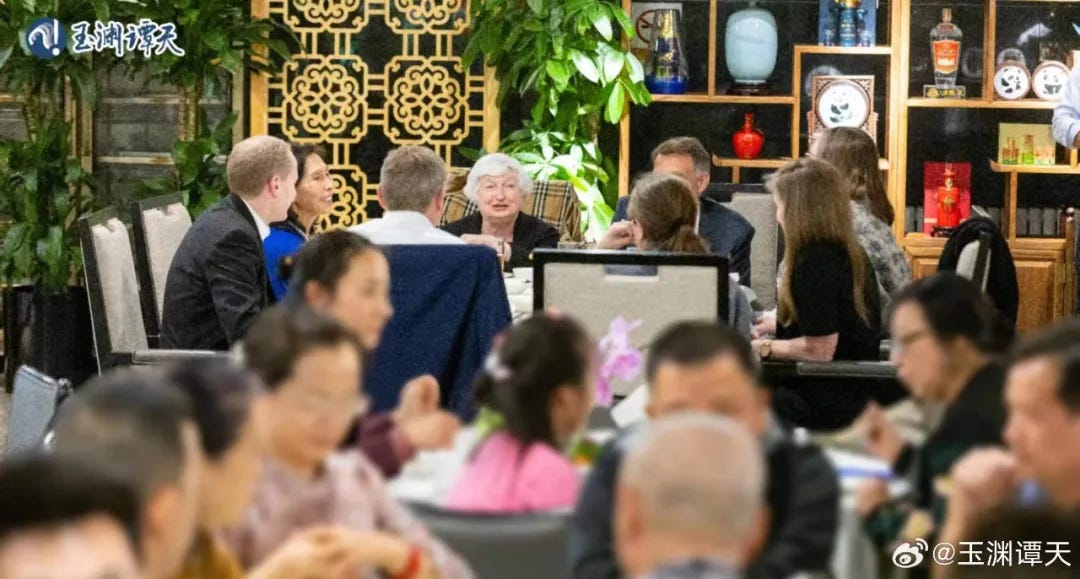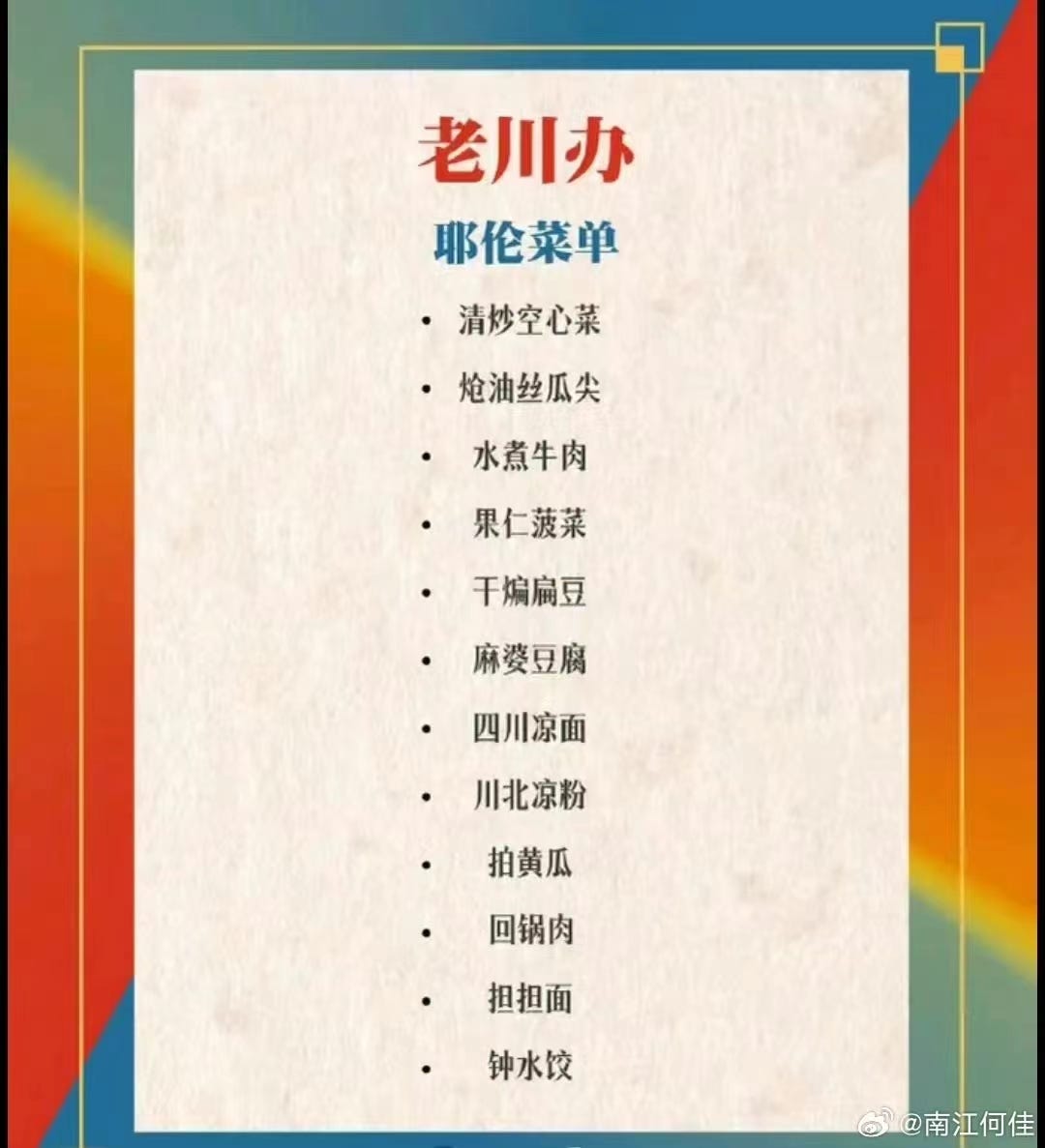Top 3 WeChat posts on Yellen's visit to Beijing
Culinary insights into China-U.S. relations, overcapacity debates, and evolving media portrayals
U.S. Treasury Secretary Janet Yellen is currently in the midst of a five-day visit to China, which commenced on Thursday. Chinese Premier Li Qiang on Sunday met with Yellen in Beijing.
It is hoped that the United States will abide by the basic norms of market economy including fair competition and open cooperation, refrain from turning economic and trade issues into political or security issues, and view the issue of production capacity objectively and dialectically from a market-oriented and global perspective, Li said.
On Sunday afternoon, the “玉渊谭天” "Yuyuan Tantian" Weibo account (Chinese version of "X") released a post mentioning the details of Janet Yellen's dinner on arriving in Beijing on Saturday night. The cooking techniques of Sichuan cuisine are used as a metaphor to emphasize the importance of grasping the direction of China-U.S. relations. Many China watchers believe that China Media Group (CMG) manages "Yuyuan Tantian."
4月6日晚,美国财政部长耶伦抵达北京,直奔老川办餐厅。#美国官员吃中国菜更要看中国史#,谭主听餐厅的工作人员说,是耶伦主动和美方工作人员提要吃川菜。
On the evening of April 6 (Saturday), U.S. Treasury Secretary Janet Yellen arrived in Beijing and went directly to Lao Sichuan Restaurant (老川办餐厅). According to the restaurant staff, the American officials, when dining on Chinese cuisine, were even more inclined to delve into Chinese history and it was Yellen who first suggested having Sichuan cuisine to her American colleagues.
就餐前,餐厅工作人员给耶伦介绍了发掘出土于四川广汉的三星堆文物,以及1000多年前的宋瓷器,并赠送了中国的非物质文化遗产蜀绣。随后耶伦也回赠了刻有她名字的美国财政部纪念章。根据美媒报道,耶伦此前在美国就经常在一家中餐馆吃一道名为“四川虾”(Szechuan shrimp)的菜。这一次,耶伦也算是吃到了正宗的川菜。
Before dining, the restaurant staff introduced Yellen to the Sanxingdui (三星堆) artifacts excavated in Guanghan, Sichuan, and Song dynasty porcelain from more than 1000 years ago. Yellen was also presented with Shu embroidery (蜀绣), an intangible cultural heritage. She gave a commemorative medal from the U.S. Treasury Department engraved with her name, as a gift exchange. According to U.S. media, Yellen had often enjoyed a dish called "Szechuan shrimp" at a Chinese restaurant in America. This time, she got to taste authentic Sichuan cuisine.
中国菜考验火候,川菜尤其是,无论是干煸还是小炒,都需要掌握火候。对于耶伦来说,美方需要掌握好中美关系的火候,确保中美关系不偏航、不失速、不相撞,在沟通与互动中,探索中美正确相处之道。
Chinese cuisine puts heat control to the test, especially true with Sichuan style - whether it be dry-fried or stir-fried. It is important for the U.S. to manage the intricacies of "heat" in China-U.S. mutual relations, and to ensure that there being no veering off course, slowing down, or collision. It remains important to explore the right way through communication and interaction.
In today's piece, we selected and translated the key paragraphs of the top three trending WeChat blog posts on Yellen's visit to China in the past three days. They were posted on April 4, 5 and 6 and they each generated more than 100,000 clicks (“10万+”), a remarkable feat for articles published on WeChat blogs.
By the way, for those interested in exploring a variety of Chinese cuisines at the finest restaurants in Beijing, I highly recommend reaching out to Yang Liu. Yang is the founder of Beijing Channel and the chairman of the "Provincial Cuisine Club," offering valuable insights and recommendations.
The first post is from an independent WeChat blog, Zhengshitang2019 (政事堂2019), which is often thought to represent the interest of China's capital elites, but has a large follower base nonetheless. It argues that Yellen's attention on new energy vehicles (NEVs), lithium-ion batteries, and photovoltaic products, the three major tech-intensive green products, or 新三样 the "new three" of excess capacity in China spells America's concerns over forthcoming meetings between Chinese and the European officials, and consequently the U.S.'s efforts to pressure China on issues that have preoccupied America's allies.
According to the division of roles between the "good cop" and "bad cop," Yellen, who plays the "good cop," is expected to showcase the most progress in repairing relations between China and the United States during this round. However, Yellen's dovish stance is only relative within the Biden administration. Before this visit, Yellen abruptly launched a severe criticism of China's new energy vehicles (NEVs), lithium-ion batteries, and photovoltaic products, the three major tech-intensive green products, or 新三样 the "new three" of excess capacity—drawing global media attention. Logically, Yellen, assigned the role of "good cop," should not act this way. Abnormal behavior often indicates something unusual, thus, this should be a key focus in analyzing Yellen's visit.
Firstly, the "new three" fall under the purview of the U.S. Commerce Secretary and the U.S. Trade Representative, not Yellen, who is overstepping her duties by making bold statements on matters outside her sphere, reminiscent of the proverb of "a dog trying to catch mice" (Note: Yellen, the Treasury Secretary, is responsible for taxation, fiscal policies, national debt, minting, financial institutions, and financial crimes, roughly equivalent to a Deputy Prime Minister in charge of finance and banking in China).
Secondly, the "new three" represent China's national policy, with upstream companies classified at a systemic security level, areas where China cannot afford to make concessions. As a pioneer in thawing China-U.S. relations, Yellen's role is to pave the way for Blinken's subsequent visit, not to demand concessions in areas where China will not budge.
Thirdly, the interest groups behind the "new three" hold no political status in the United States. Even Elon Musk does not have the standing to meet with Biden alongside other traditional automakers. These sectors lack the power to squeeze into the domain of China-U.S. rivalry or negotiations.
Based on these points, it can be surmised that Yellen's hawkish stance before the visit was a feint, with ulterior motives. The administration aims to rally allies against China by voicing concerns over the "new three," a matter of great concern to its European allies, as part of a consistent foreign policy strategy since Biden took office, especially as China is preparing for a series of upcoming China-Europe leadership meetings.
The second post is from DeDeDe of the City (城市的地得), a Chengdu-based WeChat blog that mostly writes about Chinese city life and social news. It posits that the appearance of details about Yellen's meal in Chinese official media platforms bespeak a long-lost way of reporting that renders foreign officials more likeable to the Chinese public. However, the article ends on a pessimistic note about the reticence of those present at Yellen's meal.
Yellen's first stop was Guangzhou, where the Deputy Minister of Finance from China greeted her at the airport. This would be standard practice, but in the current discouraging atmosphere of China-U.S. relations, it was considered very warm hospitality.
A news media believed to have an official background, Yuyuan Tantian (玉渊谭天), covered and live-streamed the event up close, which was undoubtedly a deliberate arrangement. In reality, their on-site reports do not contain much information, essentially amounting to the announcement that Yellen has disembarked from the plane. Media outlets like the Global Times began to prominently report on Yellen's visit to Guangzhou, focusing on details such as what she ate for her first meal, which dishes she ordered, and noting that she has mastered the use of chopsticks.
These long-absent details used to be a common way for the media to report on foreign dignitaries, as well as a way for the general public to learn about the world. However, such reports have become rare in recent years as coverage of foreign dignitaries has generally cooled off. This is especially true for U.S. officials, who are treated with caution.
The last time Yellen visited China, her meal with several Chinese female economists and entrepreneurs sparked a moderate online "human flesh search" (collective efforts of Chinese netizens to glean information about people using all possible means).
It's noteworthy that none of the participants in the meal spoke out about their impressions afterward or discussed what was talked about during the meal, as if that would touch on a taboo. In such an atmosphere, it's understandable that the visit could hardly be considered fruitful.
This time, Yellen's visit to China has indeed created quite a scene, though not that sizable. Although it's too early to talk about achieving significant outcomes (and it's unlikely that there will be any breakthroughs), there is clearly an expectation from China regarding her visit.
The third post is from the WeChat blog of Global Times, an English-language Chinese newspaper under the People's Daily. It makes a metaphor of the cooking in Yellen's Sichuan meal, and argues for greater consistency between America's words and deeds in China-U.S. relations, before offering understanding and reconciliation over past fractures.
Food for thought on Yellen's table at Washington -- Global Times, April 6 耶伦访华的这个细节,值得华盛顿深思
Washington may very well engross itself in one thought-provoking detail during Yellen's visit to Beijing. Yellen is seen frequenting little diners, mastering chopsticks, or sending welcoming gestures to the Chinese public. Odds are that Washington wants to be seen warming up to the Chinese people. However, the Chinese public simply do not buy this stock of American goods. Many Chinese remain vocal in their criticism of Washington. The Chinese feel that they have wasted their trust, with America's inconsistency between words and deeds. No pains, no gains - many Chinese now indeed see their peers across the Pacific with greater clarity. If the US really wants to engage itself in some serious signaling with China, studying public opinion, as such, would be a worthy and true case-in-point.。
We witness, including American media, a near-consensus of global public opinion leaning positively towards the communication and dialogue between China and the U.S.. While there are underlying concerns, the predominant sentiment is hope for stability and improvement in China-U.S. relations. Many of the dialogue mechanisms between China and the U.S. have been actively initiated and restored by the American side, indicating an acknowledgment from the U.S. that complete decoupling from China is not feasible, as America cannot afford the costs of comprehensive conflict with China. "When China and America cooperate, both benefit; when they fight, both suffer" – this is not an empty slogan, but a necessity rather than a choice for both parties involved. Elevating America's cost in suppressing China is never the aim of China's development, but shall remain a consequence necessarily entailed. This includes intertwined interests between China and the U.S., as well as those between China and the rest of the world.
In the latest conversation with President Biden, President Xi Jinping comprehensively stressed several key principles in China-U.S. relations this year: valuing peace, prioritizing stability, and upholding credibility. Among these, "upholding credibility" not only signifies expectations for China-US relations, but also serves as a demand on the U.S., urging it to fulfill commitments through actions. It is necessary to remind Washington that if the relatively pragmatic aspects of current U.S. policies towards China are merely utilitarian or opportunistic, the damage inflicted on mutual trust between China and the U.S. will be long-lasting. Following Janet Yellen's visit to China, we hope to see America's concrete actions that truly embody the principle of "upholding credibility."
Bonus: This is the menu allegedly ordered by Janet Yellen at the Sichuan cuisine restaurant on Saturday, translated by GRR.
Lao Sichuan Restaurant
Menu for Yellen
Stir-fried water spinach
Loofah tips salad with Sichuan peppercorn
Water-boiled beef
Spinach salad with nuts
Dry-sautéed green beans
Mapo tofu
Sichuan cold noodles
Northern Sichuan Liangfen (starch jelly)
Smashed cucumber with sesame oil and garlic
Twice-cooked pork slices
Dandan noodles
Zhong dumplings in a spicy sauce








Fascinating. The depths of meaning embedded in cuisine and dining in Chinese culture, going all the way back to the Book of Songs / 诗经 , is something few non-Chinese will ever understand.